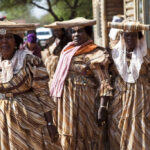Congolese President Felix Tshisekedi’s call for international sanctions against Rwanda highlights the complexities in the Democratic Republic of Congo (DRC). In his recent UN address, he noted that the M23 rebel group’s actions, reportedly backed by Rwanda, have displaced over 7 million people. This post explores the situation, the potential impact of sanctions, and Rwanda’s role in the crisis, emphasizing the urgent need for action to help stabilize the DRC.
sanctions on Rwanda
The DRC has faced instability and human rights violations due to armed groups fighting for its resources. President Tshisekedi recently called for international sanctions on Rwanda for allegedly supporting the M23 rebels. This post explores the implications of these sanctions, the humanitarian impact of the crisis, and the geopolitical context involved.
Background of the DRC’s Crisis
The M23 group, which began its rise in 2012, has been a significant destabilizing force in the eastern DRC. While it has roots in earlier conflicts, its resurgence is largely attributed to various local grievances and regional dynamics, including Rwanda’s involvement. The M23 has been accused of numerous human rights violations, further complicating an already dire humanitarian situation.
Historically, tensions between Rwanda and the DRC have been fueled by complex factors, including ethnic rivalries, refugee movements, and the control of resource-rich territories. Understanding this backdrop is essential to grasping the urgency of Tshisekedi’s call for international sanctions against Rwanda.
President Tshisekedi’s Call for Sanctions
During his recent speech at the UN, President Tshisekedi claimed that Rwandan troops are aiding the M23. He referenced UN expert reports suggesting that 3,000 to 4,000 Rwandan soldiers are collaborating with M23 rebels, increasing instability in the DRC.
Tshisekedi’s advocacy for sanctions against Rwanda is crucial not just as a means of holding accountable those responsible for fueling the conflict but also as a way to prompt international action towards resolving the broader humanitarian crisis that has ensued.
Humanitarian Impact
The humanitarian impact of the ongoing conflict in the DRC is staggering. According to various estimates, over 7 million people have been displaced, leading to one of the most significant humanitarian crises globally. Humanitarian organizations are struggling to provide adequate assistance as violence disrupts access to affected communities.
Women and children are highly vulnerable, enduring food shortages, inadequate healthcare, and violence. Organizations like the International Rescue Committee and Médecins Sans Frontières urge immediate international action to ease the conflict’s impact.
International Response to Rwanda’s Alleged Actions
The international community has long been aware of the tensions between Rwanda and the DRC. Previous sanctions against Rwanda have had mixed results, often criticized for their limited impact on the ground. However, the current situation calls for renewed measures to address the escalating crisis.
The United Nations has historically played a role in peacekeeping and conflict resolution in the region. However, concrete actions based on Tshisekedi’s revelations about Rwandan involvement could be pivotal in reshaping the dynamics of the situation. More robust international pressure could change Rwanda’s calculus regarding its support for the M23 group.
The Need for Comprehensive Action
Sanctions are crucial but need to be part of a broader strategy for the DRC’s complex conflicts.. Engaging regional actors and fostering dialogue among all stakeholders can help mitigate the ongoing violence and support political solutions.
Tackling root causes of conflict like poverty and governance issues is vital to prevent future escalations. The global community must focus not only on punitive measures but also on development strategies that empower local communities.
Conclusion
The call for international sanctions against Rwanda represents a significant moment for the DRC and the broader Central African region. As humanitarian crises continue to deepen, the need for decisive action grows more urgent. President Tshisekedi urges global unity to tackle crises with immediate and long-term strategies.
For a more detailed examination of the humanitarian impact in the DRC and the implications of international actions, refer to Amnesty International and Human Rights Watch.


